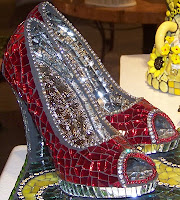Home, but I am still haunted by the Estate Sale. How does one write away this day? The wine runs warm in my veins, as I wander from room to room. I touch the embroidered duvet that holds my down comforter on the futon that is my bed.

I glance and smile at the small altar with flickering candle in the corner of the room, touch the bar by the kitchen where I sit most mornings and sip coffee from an old gilt-edged cup, eat breakfast and pat cat who sits on the stool beside me. I remind myself as I pass through the dining room, that I really should refinish the pub table and chairs someday. I’
ve been going to do it for 10 years.
The old couch in the living room – comfortable from day one – is still sturdy, if a little worn. How many books have I read curled up in one corner of it or another? The bentwood rocker, where I rocked Dawn, now grown and gone her own way, is now the cat's favorite perch. She leaps up and settles to rock and then does it again and again. I pass the old chair made of 2X4’s with a
macramé seat holding a queen-sized pillow in red silk slip. I made it for my first apartment. A single mom at 18, I could just afford a real bed for the kid and not much for me. The large glass coffee table strewn with memories on its second shelf: mouth blown glass fishermen’s’ floats collected at the beach so long ago, a wizard carved in wood with a staff in his hand, my very own crystal ball and far too many books.

I make my way to and through the French doors to the table and chair on the balcony. It’s wrought iron and wooden with canvas covered seats I made myself. I sit, pen in hand to blank page to write away the day and nothing comes.
How does one write away a day like this? To know that all my treasures will one day be another’s trash. I cannot get this morning’s estate sale out of my mind.
The house was just over off Elm and Monroe – the big pink monstrosity Ba and I so often joked about. We’d gone to many such sales. The elderly in this quiet Virginia-Highland neighborhood are of an age where deaths are frequent. Today’s sale in the old pink house was different. The old woman sat there at the table next to her daughter and the woman running the sale and watched with eyes glazed and knowing, as we strangers fingered first this, then that.
How must she feel to watch all she owns and holds dear parceled out at pennies on the dollar – sold to strangers? How many family dinners did she prepare on that old stove? Which of the handmade aprons on the rack at a dollar apiece did she wear and wash and iron with care most often? How many children’s tears did she wipe away with its hem? How often was each one blessed with cookie dust and messy-mouthed hugs?
I know we
shouldn’t be slaves to possessions – mere things mean nothing – I wonder.
The iron bed in the corner of her bedroom looks so very old; its tired mattress has a hollow place down its very center. Once she lay with a husband there and perhaps birthed and nursed this daughter sitting beside her – now grown, gavel in hand – going, going, gone.
Without a biographer for our lives, all we leave behind are things that chronicle our passage. But few will know and fewer remember, if I don’t tell them, the importance of each piece. I say importance, but their only value is to me – they are a gentle prod to memory of a life lived. It is the memory that is dear to the soul. Sell them or give them away when I’m gone – when she’s gone. But to have her sit and watch – how cruel is that?
The thoughts were there this morning, as I walked from room to room in that house. I knew what I would write – the words flowing through my head sounded so profound. But as I sit here now with pen in hand, as night creeps toward me, those words have fled on down the road as if they’d never been – perhaps to someone who would give them immediate attention and not dawdle over other things.
Now of the thousand thoughts I had this morning, all are gone and I sit here with an empty page and fill it with feelings roughly cobbled into word after word hoping to shake loose a few gems still lingering somewhere deep within that would end this piece brilliantly. But I have none of my own; I can only think of that line from a childhood movie.
"There's no place like home."
© Perle Champion







